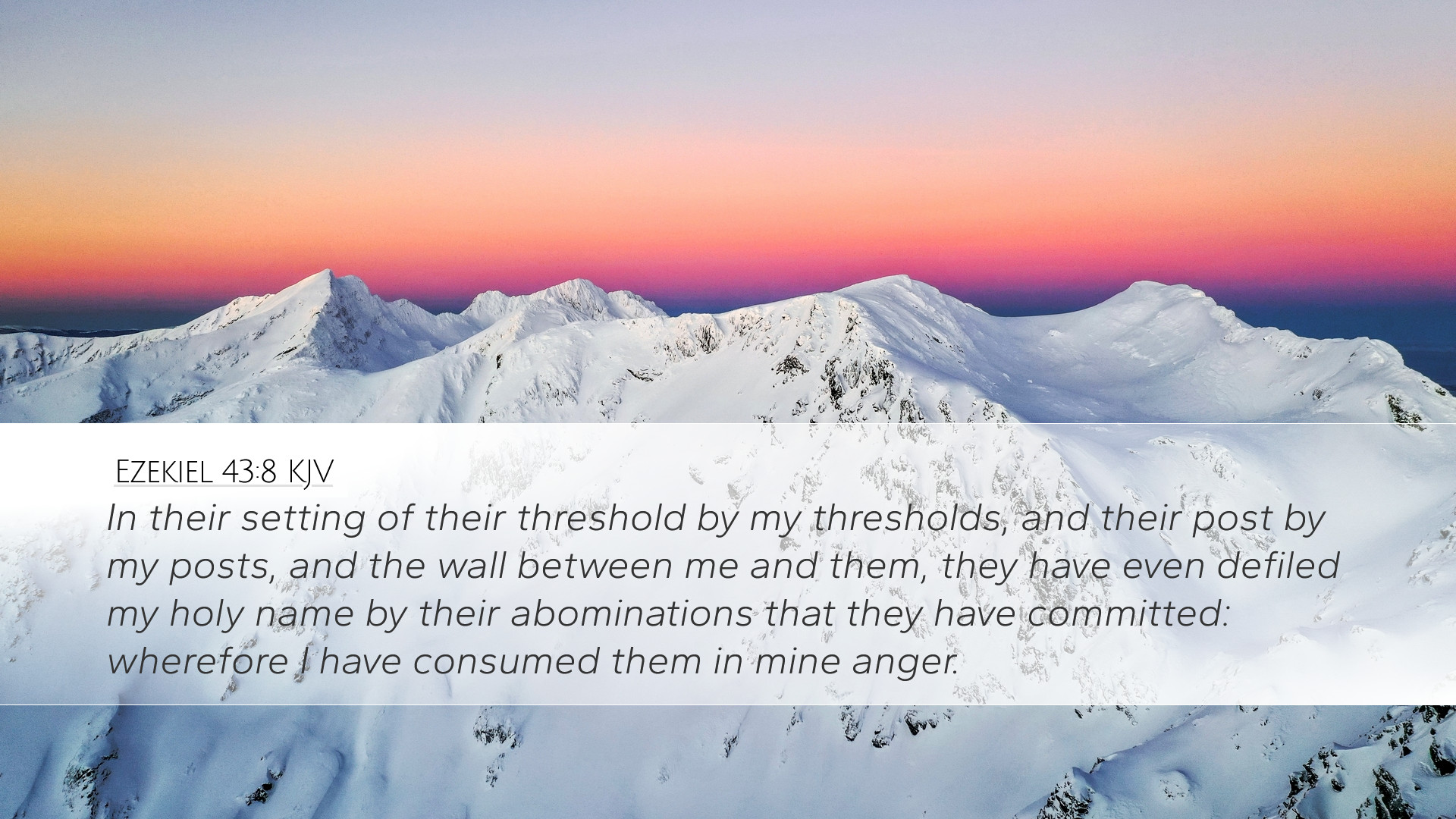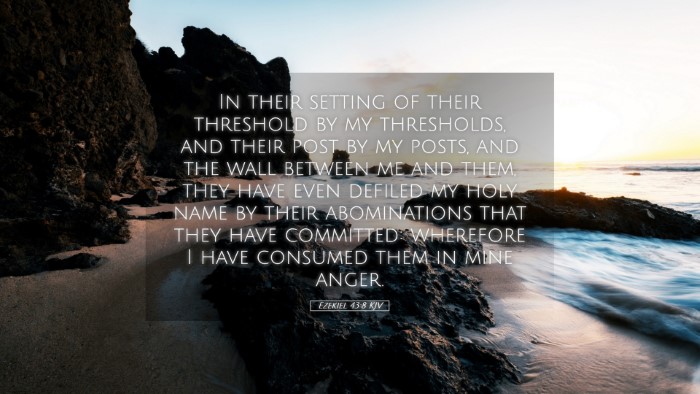Commentary on Ezekiel 43:8
Ezekiel 43:8 states: "In their setting of their threshold by my thresholds, and their post by my posts, and the wall between me and them, they have even defiled my holy name by their abominations that they have committed: wherefore I have consumed them in mine anger."
Contextual Background
The verses preceding Ezekiel 43:8 address the vision of the glory of the Lord returning to the temple. Ezekiel, in his prophetic mission, emphasizes God's presence and holiness, which includes His concern over the behavior of the people and how they interacted with sacred spaces.
Theological Insights
Commentators like Matthew Henry emphasize that this verse highlights the contrast between the holiness of God and the sins of the people. Henry notes that the "threshold" and "post" represent significant spiritual boundaries that the Israelites have neglected.
Albert Barnes identifies the physical imagery of the thresholds and posts as a metaphor for the spiritual state of Israel at that time. He explains that the people’s proximity to the temple did not translate into true worship or reverence. Their superficial engagement led to God's anger because they normalized sin at the very places that should have represented sanctity.
Adam Clarke further elaborates on the "wall" that stands between the people and God. It symbolizes the separation caused by their sins. Clarke points out that God’s response to their defilement was both just and necessary, as He remains a holy God who cannot cohabitate with iniquity.
Interpretation of the "Defilement"
The term "defiled" in this context carries grave implications. It indicates the extent to which Israel had corrupted their relationship with God. Henry indicates that their actions were deliberate, signifying a conscious choice to pursue abominations.
Barnes complements this by mentioning that the defilement was both a collective action and indicative of a wider societal failure to uphold covenantal obligations. The violation of these sacred spaces led to divine judgment.
Furthermore, Clarke provides insights into the nature of "abominations" that were committed. He discusses how idolatry, false worship, and other sins had become commonplace in Israel, reflecting a gross misunderstanding of their covenant with God.
Consequences of the Actions
The latter part of the verse communicates the consequences of such actions: divine anger and consumption. This is a warning that resonates throughout Scripture. Henry reminds readers that God’s judgments are often a direct result of human actions, especially in the context of covenant faithfulness.
Barnes reinforces this by discussing the concept of divine retribution, underscoring that the people’s lack of a sincere heart led them down a path of destruction. Their negligence had dire consequences, not only for their physical state but also for their spiritual standing before God.
Clarke echoes similar sentiments, mentioning that God's anger in the Old Testament was closely linked to His love for His people. The anger was not arbitrary; rather, it was a response to their failure to honor Him and heed His commands.
Application for Today
Pastors and theologians may draw several lessons from Ezekiel 43:8:
- Holiness of God: The emphasis on God's holiness serves as a reminder that contemporary believers must be vigilant in maintaining the sanctity of their lives and worship.
- Spiritual Vigilance: Just as the Israelites allowed sin to infiltrate sacred spaces, so too can modern believers fall prey to complacency regarding spiritual boundaries.
- Consequences of Sin: The acknowledgment of divine anger over sin serves as a warning and a call to repentance. Believers today are called to examine their lives for areas of compromise.
- God's Faithfulness: Despite Israel's failure, God's ultimate desire is for restoration. Pastors can remind congregations that God's anger is always directed towards our return to Him, emphasizing His grace and willingness to forgive.
Conclusion
In summary, Ezekiel 43:8 invites readers to reflect on the severe nature of sin and the equally profound holiness of God. The insights from public domain commentaries reveal the layers of meaning within this verse, bridging ancient texts with contemporary applications. For pastors and scholars alike, it serves as a powerful reminder of the consequences of infidelity to God’s covenant while simultaneously calling for a return to true worship and reverence.


